
A newly approved medicinal cream made from pineapples could be a “game-changer” for burn patients, doctors say.
At Stony Brook Medicine’s burn center in New York, doctors recently started using NexoBrid, which became commercially available on Sept. 20, to treat deep burns.
This is a departure from surgical skin grafting, which has been the go-to treatment for the past few decades, according to Dr. Adam Singer, an emergency medicine physician at Stony Brook.
MOST NOTABLE DRUG AND VACCINE APPROVALS OF 2023, ACCORDING TO PHARMACISTS
“Since 1970, the standard of care for deep burns has required an operating room and a surgeon to cut it out,” he told Fox News Digital.
Singer compared the surgical treatment to slicing cheese — “where you cut sequential slices of the burn tissue until you get down to normal, healthy tissue where it bleeds, and then you put a skin graft on it.”
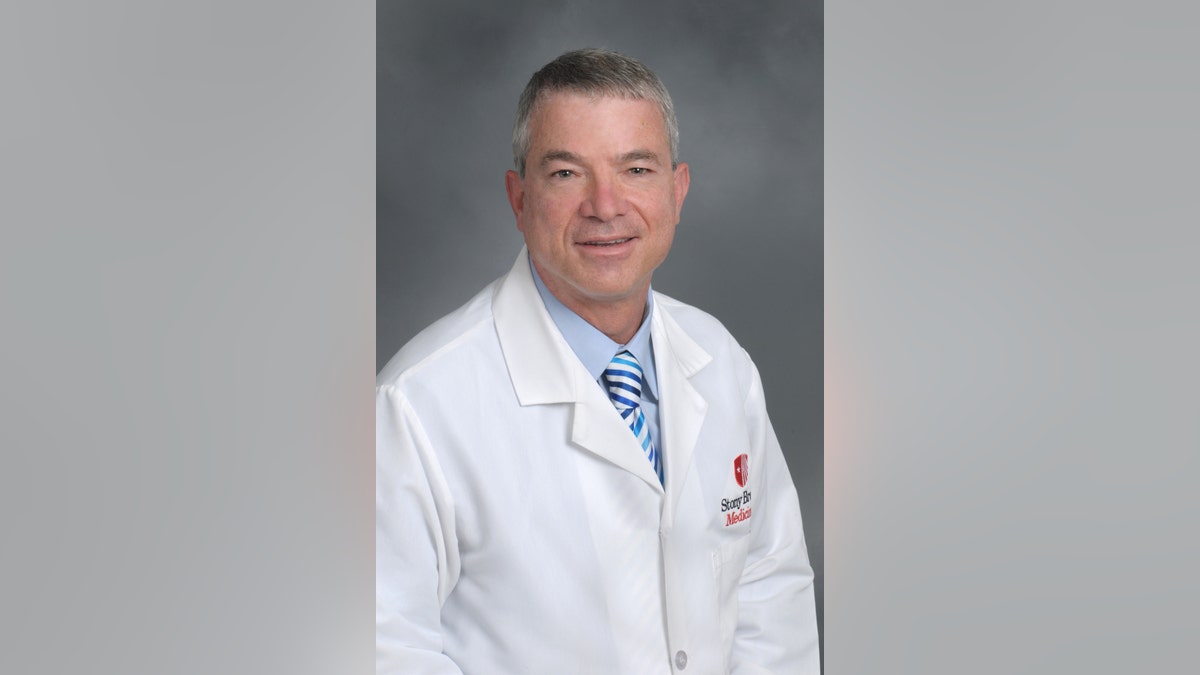
Dr. Adam Singer, an emergency medicine physician at Stony Brook Medicine in New York, participated in the clinical trials for NexoBrid. (Stony Brook Medicine)
With MediWound’s new topical medication — which contains an enzyme called bromelain that’s derived from the stems of pineapples — patients are far less likely to need a surgical procedure, the doctor noted.
“You apply it to the burn, and within four hours, it dissolves the burn tissue,” Singer said.
“It’s very selective — so the minute it hits normal tissue that is not burned, it stops dissolving.”
With grafting, healthy tissue is often inadvertently removed along with the burn tissue, Singer pointed out.
“That tells us that we’re not very good at distinguishing between third-degree and second-degree burns,” he said.
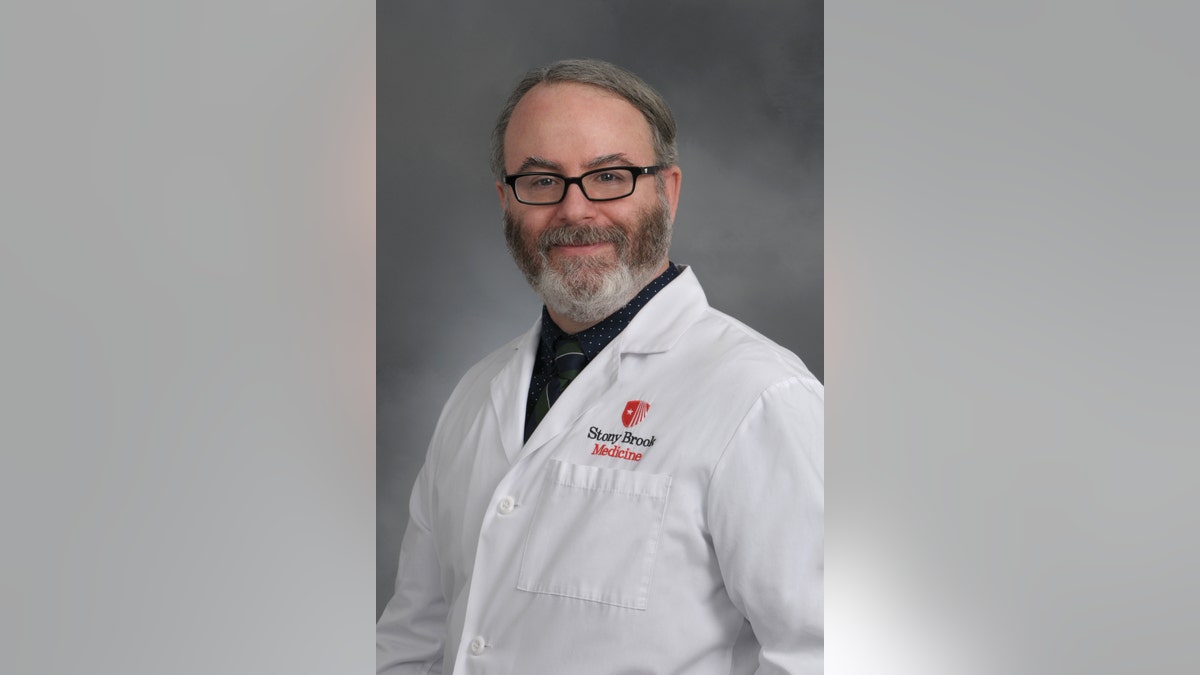
“It really opens up a whole new avenue of wound care beyond just burns,” said Dr. Steven Sandoval, a burn surgeon at Stony Brook Medicine. (Stony Brook Medicine)
NexoBrid removes all of the burn tissue within four hours — allowing doctors to see how deep the burn is and whether the patient will require a skin graft.
“In many cases during trials, once we applied the cream, we found that the burn wasn’t that deep, which then enabled the patient to heal spontaneously without the need for a skin donor site,” said Singer.
The cream also allows doctors to diagnose the depth of burns much faster.
Traditionally, they had to wait up to a week to make that determination, which increased the risk of infection.
“It’s basically turning a surgical disease into a medical disease that’s treated at the bedside instead of in the operating room.”
“If we apply the burn cream right after the injury, we immediately know how deep it is,” said Singer.
In clinical trials, researchers found that use of the cream reduced surgery occurrence from 72% of patients to just 4%.
“It’s basically turning a surgical disease into more of a medical disease that’s treated at the bedside instead of in the operating room,” Singer noted.
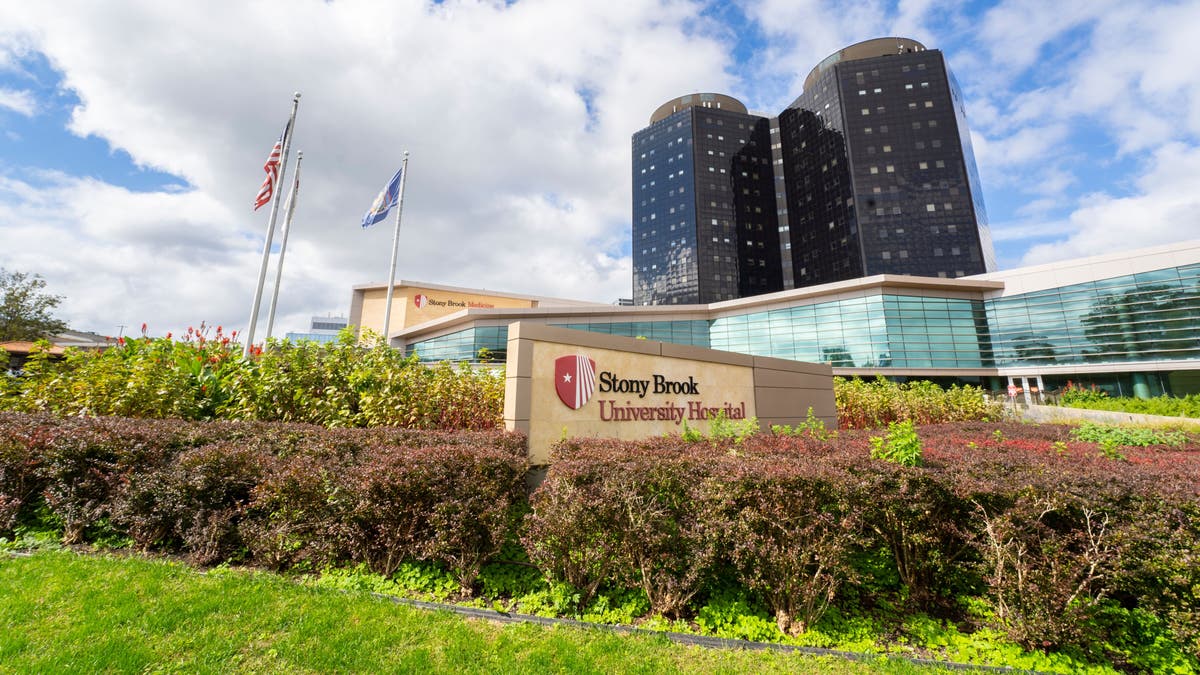
At Stony Brook Medicine in New York, doctors have treated many patients with NexoBrid during clinical trials — but this month marked the first time they used the medication on “regular” patients, now that it’s commercially available. (Stony Brook Medicine)
The amount of bleeding is also much less than when a knife is used to remove the tissue, as it’s a minimally invasive treatment.
At Stony Brook, doctors have treated many patients with NexoBrid during clinical trials, but this month marked the first time they used the medication on “regular” patients, now that it’s commercially available.
The first patient, a 53-year-old New York man, was involved in an accident with his firepit that caused second-degree and third-degree burns to his legs.
“Normally it would have taken us several days to see what would stay healthy and what would convert to a deeper burn,” Dr. Steven Sandoval, a burn surgeon at Stony Brook Medicine, told Fox News Digital.
But in this case, the doctors applied the newly available medication.
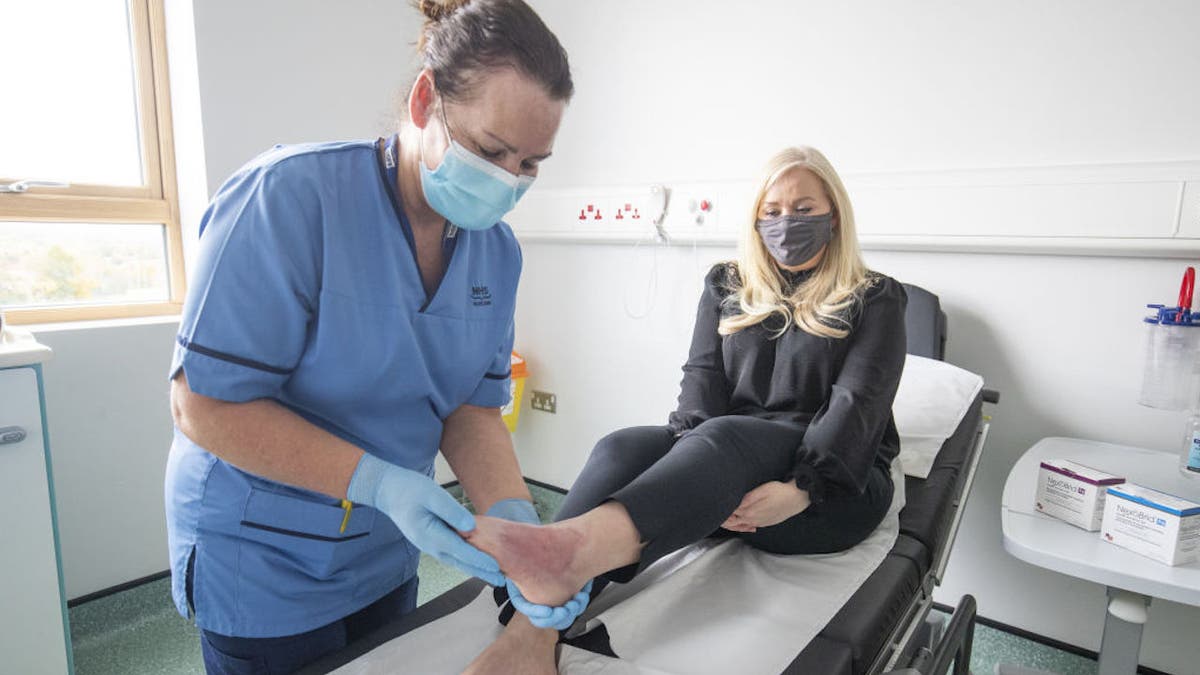
A patient in Foulden, Berwickshire, has the burn wound on her foot checked by a nurse at the burn unit at St John’s Hospital, Livingston. The patient received a new treatment called NexoBrid that uses enzymes extracted from pineapple plants to help remove dead or burned skin. (Getty Images)
Four hours after applying NexoBrid, the doctors were able to see exactly how deep the wounds were.
“The pineapple gel ate away at any non-living tissue,” Sandoval said. “We were able to shave off days of hospitalization.”
Within just two weeks, the patient was healing well enough to be discharged.
The second patient who received NexoBrid was involved in an electrical-based fire, which typically creates even more severe burns than flame-based injuries.
“Again, within four hours, it removed the dead tissue and allowed the healthy tissue to progress,” said Sandoval.
Both patients were able to avoid surgery.
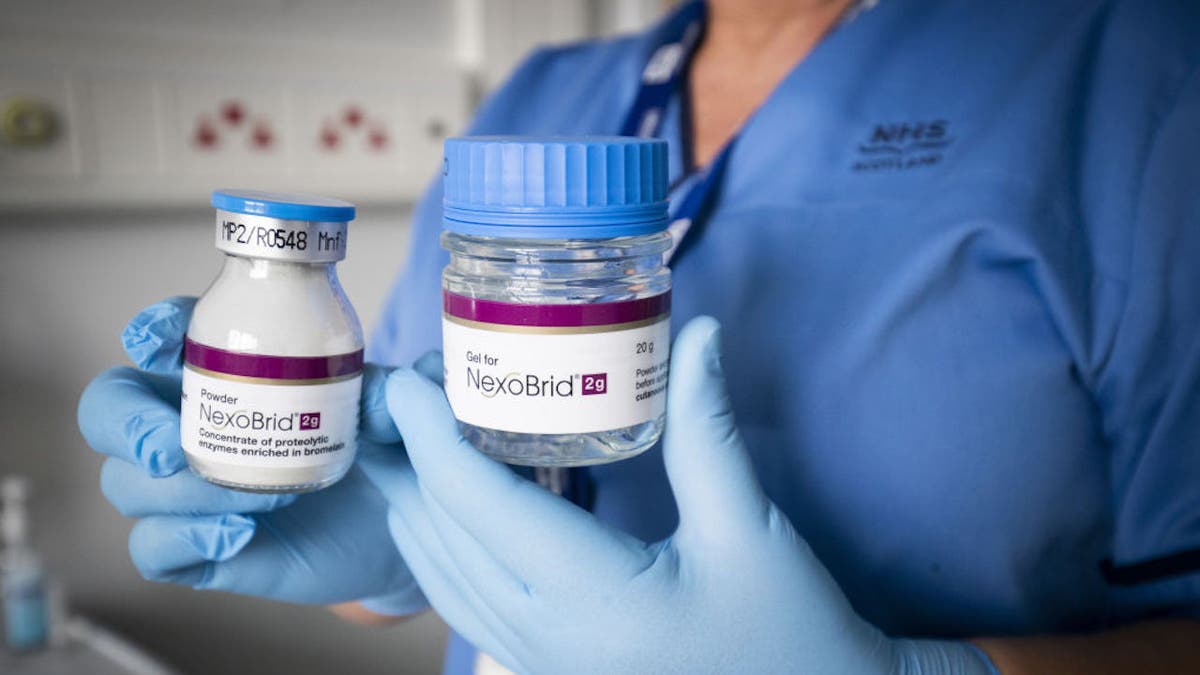
A nurse at the burns unit at St John’s Hospital, Livingston, holds jars of NexoBrid, a new treatment that uses enzymes extracted from pineapple plants to help remove dead or burned skin. (Getty Images)
Dr. Marc Siegel, clinical professor of medicine at NYU Langone Medical Center and a Fox News medical contributor, noted that “enzymatic debridement” creams aren’t new.
“They have been around since at least 2008 and have been used extensively, including by Israeli [doctors], who have extensive experience treating burns from combat victims,” he told Fox News Digital.
“This particular cream may be more effective than previous versions,” Siegel added, referencing NexoBrid.
“This cream does not rebuild new tissue and does not prevent the need for skin grafting in the most severely burned patients.”
It may not prevent the need for surgery in all cases, however.
ASK A DOC: ‘WHAT SHOULD I DO, OR NOT DO, PRIOR TO SURGERY?’
“When there is too much dead tissue in important areas, skin grafts become necessary,” Siegel noted. “This cream does not rebuild new tissue and does not prevent the need for skin grafting in the most severely burned patients.”
Singer and Sandoval acknowledged that other enzymatic agents have been available, but said they work much slower than the new medicine.
“There is no other current gel on the market that’s as quick as this,” Sandoval told Fox News Digital. “There’s one other gel on the market that softens up the non-viable burn tissue, but it takes several weeks to work.”

MediWound’s new topical medication contains an enzyme called bromelain that’s derived from the stems of pineapples. (iStock)
NexoBrid has been approved in Europe since 2014 but wasn’t approved in the U.S. until just before the start of 2023.
The medication is currently approved for adults with a certain depth of burns.
CLICK HERE TO GET THE FOX NEWS APP
It can be applied to any part of the body except the face and genitalia.
The only noted side effect of the medication is some degree of pain.
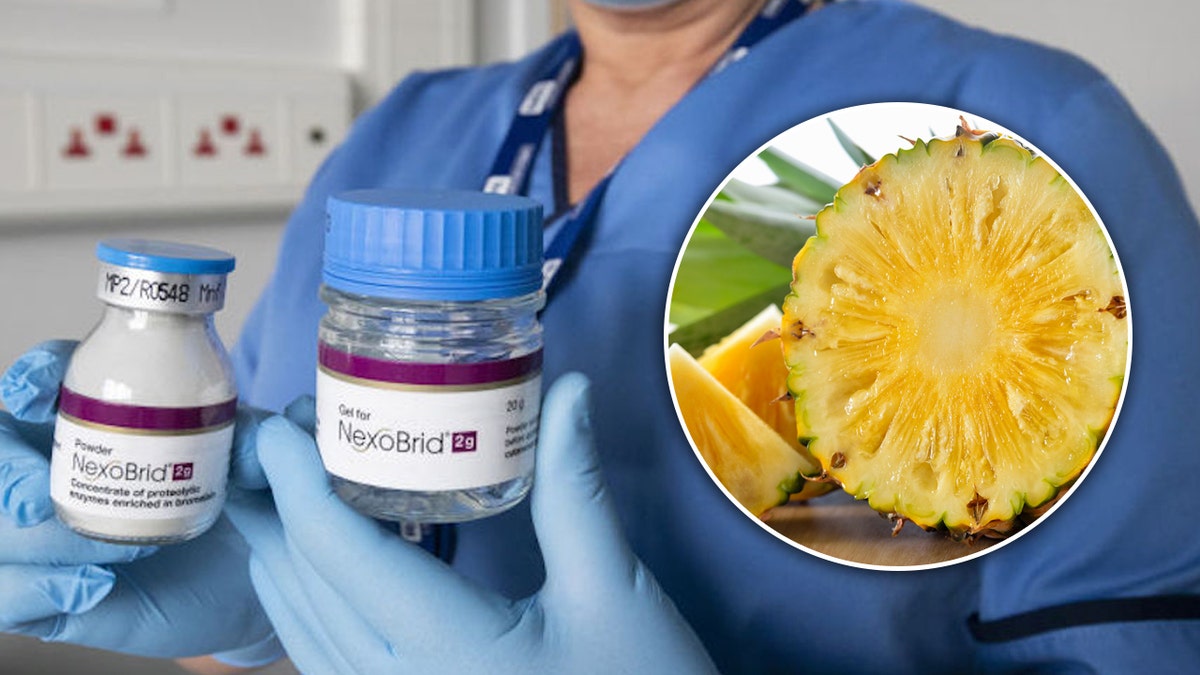
NexoBrid has been approved in Europe since 2014 but wasn’t approved in the U.S. until just before the start of 2023. (Getty/iStock)
“Everybody is different in how they respond to the sensation of the cream itself,” Sandoval told Fox News Digital. “Some patients require more pain medication than others.”
Looking ahead, the doctors hope that NexoBrid will be cleared for use with children and for other wounds that have dead tissue, such as advanced bed sores.
CLICK HERE TO SIGN UP FOR OUR HEALTH NEWSLETTER
Sandoval added, “It really opens up a whole new avenue of wound care beyond just burns.”